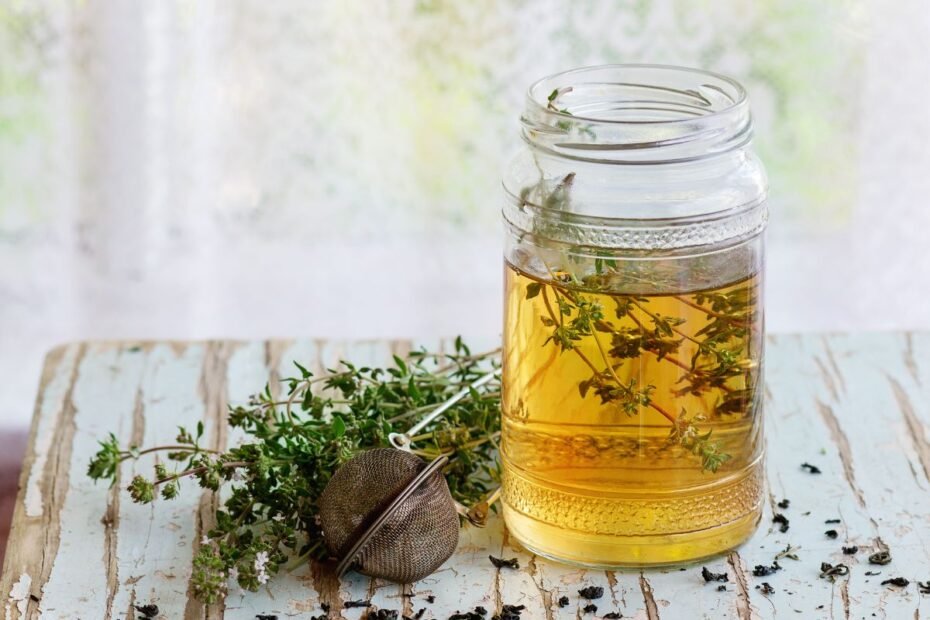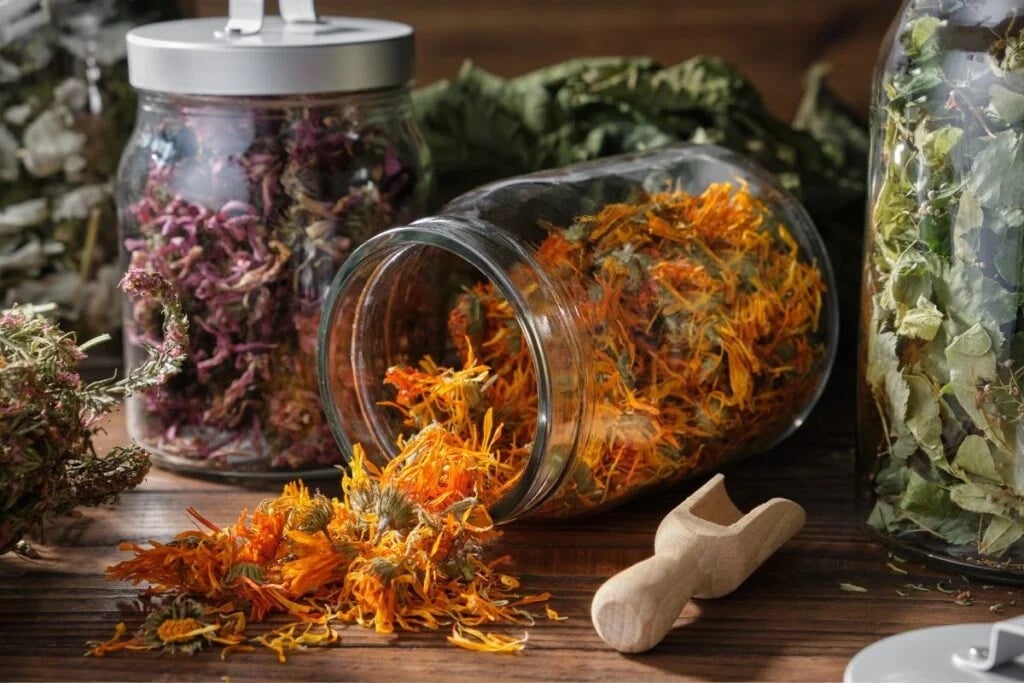Thyme (Thymus) belongs to the genus Lamiaceae. It is an aromatic semi-shrub with thin, prostrate, upward-growing, woody stems. The leaves are tiny, and the flowers are head-shaped inflorescences. There are many species of thyme in the Lamiaceae family. Still, the most popular and abundant are common thyme (Thymus vulgaris), broad-leaved thyme (Thymus pulegioides), and wild thyme (Thymus serpyllum). Thyme grows naturally in meadows, but people can also sow and cultivate it. These herbs are often used to make thyme tea. Further, you will learn about thyme tea benefits.
Tyme is a well-known spice added to various dishes. It creates a spicy, unique flavor and an unusual aroma. People use thyme to flavor salads, pasta, meat, fish, and potatoes.
In the past, our ancestors also used this plant in mystical rituals. People believed that thyme warded off witchcraft. And its scent could scare away evil forces and unearthly creatures.
Thyme Tea Benefits for Health
Thyme contains up to 1% essential oils. A third of the oil composition is thymol, which has anthelmintic, anti-inflammatory, and painkilling properties. Thyme’s anti-inflammatory and antimicrobial properties can help with skin diseases. It can help get rid of bacterial infections and reduce inflammation. As a result, thyme can help with the irritation and inflammation of eczema and acne.
Scientists prove that thyme contains thymol, potassium, vitamin A, vitamin C, and magnesium. Because of this composition, regular consumption of thyme tea in small amounts can help:
- strengthen the immune system
- improve skin conditions
- improve appetite
- relieve migraines
- improve mood
- improve eyesight
- alleviate respiratory diseases
- improve sleep
- help calm down
- improve kidney function (diuretic effect)
- refreshing and tonic
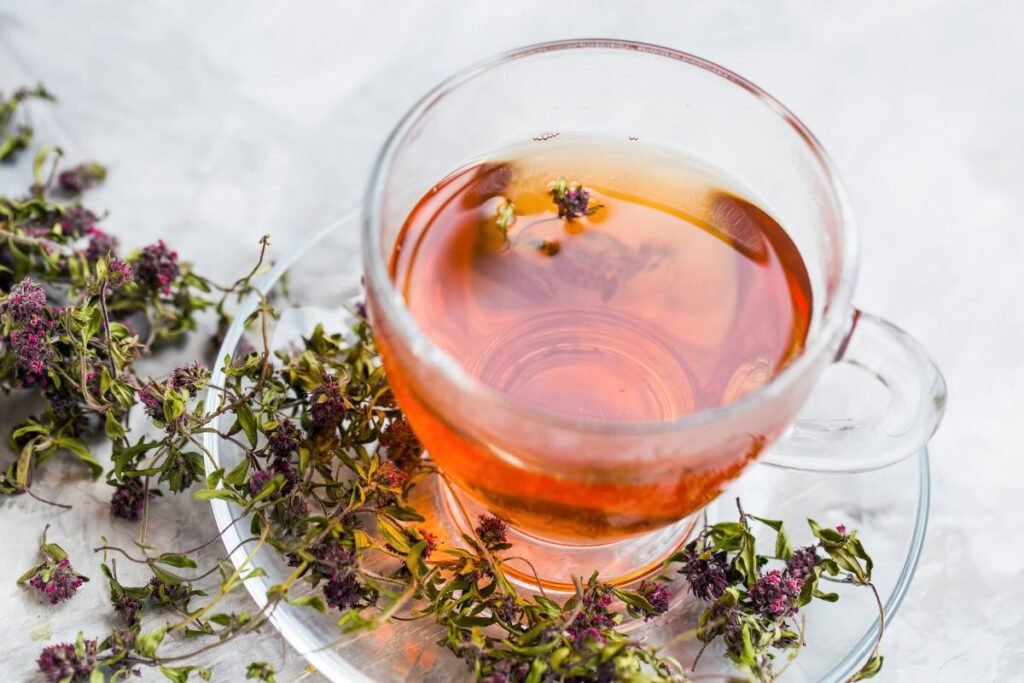
Benefits of Thyme Tea for Women
Thyme tea benefits to treat following female ailments:
- inflammation of the uterine appendages
- painful and prolonged menstruation
- hormonal disorders
- during menopause
- migraine relief
Pregnant women should be cautious about the dosage of this tea. It is better to consult a doctor before taking thyme tea.
Thyme Tea Benefits for Men
Thyme tea is highly beneficial for men’s health. It is excellent at counteracting urinary tract inflammation and infection. This tea can reduce the swelling of the urinary tract in cases of prostatitis, thereby improving the elimination of urine from the body.
Thyme tea benefits men’s baldness. The ursolic acid in the herb stimulates follicles and hair growth.
Harvesting Thyme
Let’s start harvesting thyme when they flower, and cut flower clusters and young stems. The harvest season is from June to early autumn. Thyme should be dried in a well-ventilated room or outdoors in the shade. Thyme can also be dried in the oven, but the temperature mustn’t exceed +40 °C. Dried herbs can be used for up to 3 years. Herbs should only be stored in cloth bags or glass jars in a cool, dry place. The herbs must be protected from odors and direct sunlight.
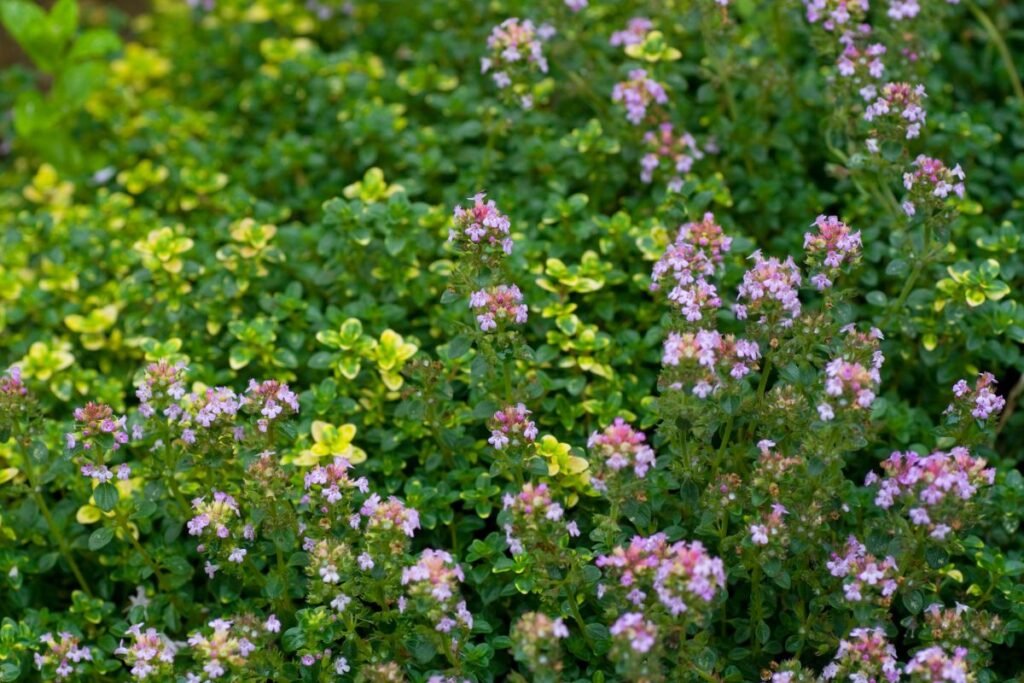
How to Make Thyme Drink
Thyme tea can be taken on its own to taste, either robust or mild. It also fits well with classic black and green teas or other herbs, depending on what flavor you prefer or the healing properties you expect. Here are some recipes for you to try.
A Classic Thyme Tea Recipe
This thyme tea is a preventive remedy for colds, viral illnesses, and digestive tract diseases. It stabilizes strength and overcomes insomnia. It can also have a general strengthening effect on the human body.
You should need:
- a cup
- 2 teaspoons of dried thyme
- 200 ml of boiling water
Pour boiling water over the thyme, cover, and leave for 10 minutes. Before drinking, you can strain the tea and sweeten it with your favorite sweetener.
Thyme with Green Tea
This thyme tea recipe has a tonic effect, can ease colds, and normalizes digestion.
You need:
- a cup for the preparation of the tea
- 1 teaspoon of dried thyme
- 1 teaspoon of green tea
- 200 ml of boiling water
Steep the thyme in boiling water, cover, and leave for 5 minutes. Cool it down a little, add the green tea, and leave it to steep. Cover it again for another 5 minutes. Depending on the type of green tea, green tea is at its best when brewed in hot water at 60–90 °C. You can strain it, sweeten it with honey or your favorite syrup, and add a slice of lemon.
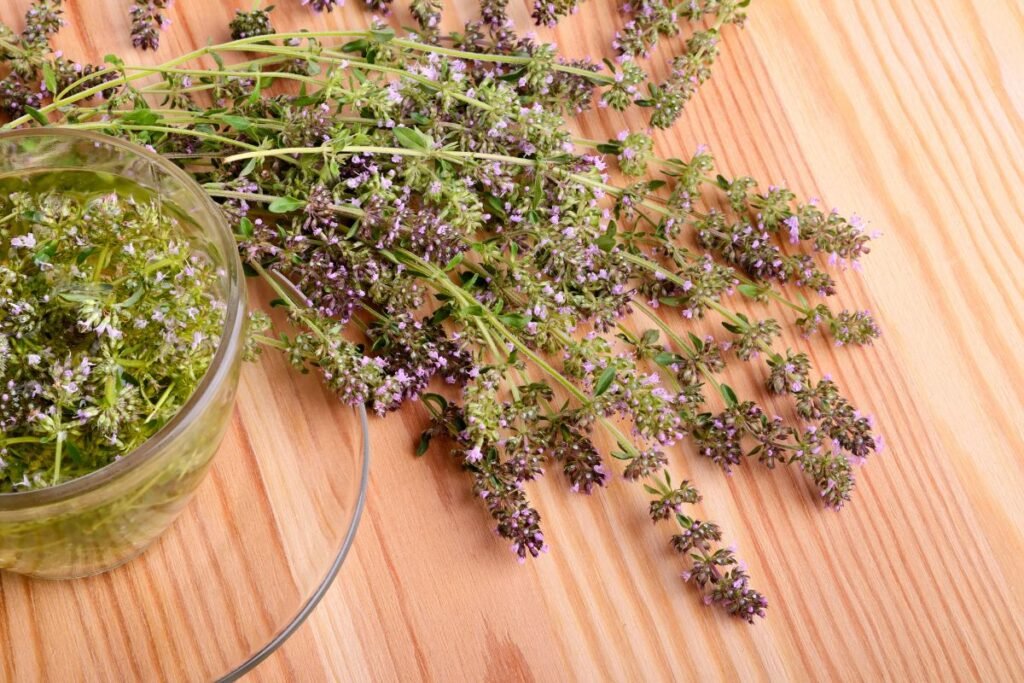
Black Tea with Thyme
You need to use a small amount of thyme in this recipe. That’s why this blend is ideal to consume in unlimited quantities. Thyme adds a piquant touch to the black tea and enlivens its taste.
You need:
- a heat-resistant vessel for brewing tea
- 3 teaspoons of black tea
- 1 teaspoon of dried thyme
- 500 ml of boiling water
Pour the water into a pan, bring it to a boil, and add the black tea. Boil for 3–5 minutes. Put the dried thyme in the pan. Leave for 5–10 minutes to steep. Strain the tea and pour it into about one-third of the cup. Fill up with hot, boiled water.
Thyme and Peppermint Tea
Peppermint gives off a fresh aroma, satisfies thirst, and even positively affects well-being. Peppermint tea and thyme mix can normalize the digestive tract and eliminate many stomach problems.
You need:
- a cup of tea for brewing
- 1 teaspoon of dried peppermint
- 1 teaspoon of dried thyme
- 200 ml of boiling water
Pour boiling water directly over the herbs in the pot, cover, and leave for 5–10 minutes. Drink a half cup (about 100 ml) before each meal.
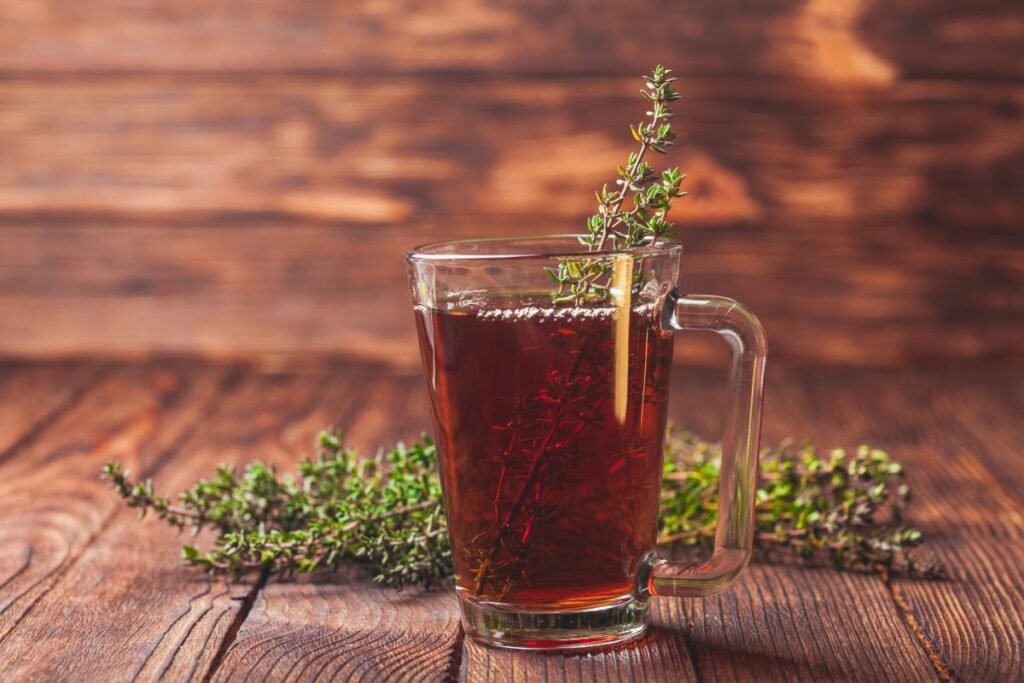
Thyme Infusions for Your Beauty
Thyme tea can also be beneficial for your beauty. Here are some easy-to-make recipes to produce a natural remedy at home to treat your skin, solve various skin problems, or enhance your beauty.
Thyme Infusion for The Skin
Thyme infusion compresses help to strengthen blood vessels, treat abscesses, and relieve inflammation. This infusion also cleanses and tones the skin.
You need:
- 2 tablespoons of dried thyme
- 450 ml of boiling water
Place the thyme in a container, cover it with boiling water, cover it with a lid, and leave for half an hour. Then strain the infusion and pour it into a glass container. Close the container tightly. You can store this infusion in the refrigerator for up to eight days.
Soothing Thyme Infusion
This infusion can help to reduce wrinkles, tighten pores, and relieve redness and flaking. Use a moistened cotton pad to clean problematic areas of the skin.
You need:
- 5 grams of dried thyme
- 5 grams of dried chamomile
- 50 ml of boiled water
Mix the herbs and pour boiling water over them. Leave it for about 20 minutes, then strain. An infusion’s shelf life is one day.
Cosmetic Ice with Thyme
Thyme can effectively rejuvenate the skin and smooth fine lines. The cold effect of this recipe increases the synthesis of skin collagen and elastin.
You need:
- 50 ml of thyme infusion
- 5 ml of grapeseed oil
- 25 drops of almond oil
Mix the strained thyme infusion with the oils, pour into molds, and freeze. Massage the cubes into the skin with light gliding movements. Use it in the evenings.
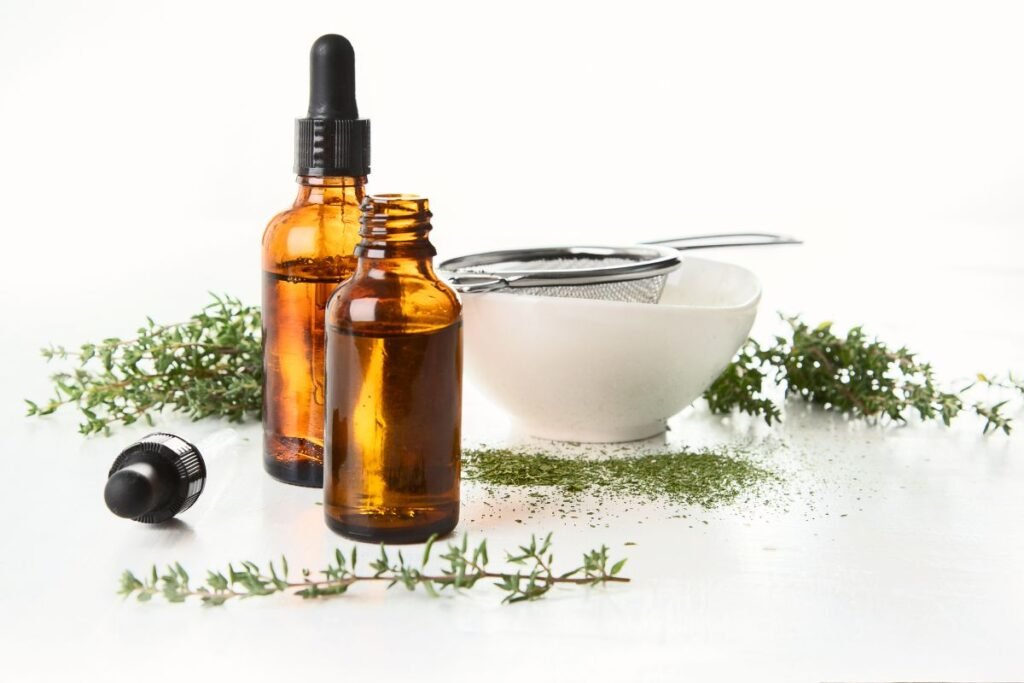
Thyme Tea Side Effects
Thyme tea should not be drunk in unlimited quantities. Excessive doses can cause agitation, fear, insomnia, or nightmares instead of the expected calm. Thyme tea with alcohol may lower blood sugar levels.
Also, you need to study the compatibility of various medications with thyme. The herb may reduce the effectiveness of some medicines or even cause an allergic reaction.
People allergic to herbs such as basil, oregano, sage, and lavender are likely to be allergic to thyme. This can include skin sensitivity when touching thyme leaves. You can feel nausea, heartburn, diarrhea, and vomiting when eating the herbs or drinking their tea.
Thyme tea should not be abused by breastfeeding women but should be taken only sparingly, or rather weakly.
Thyme tea and drinks containing thyme should be avoided by:
- people with liver disease
- pregnant women
- nursing women
- people suffering from constipation
- patients with asthma
- people with high blood sugar levels and cardiovascular problems
- people with thyroid problems
You should always consult your doctor about the use of thyme tea.
Research and sources:
https://www.webmd.com/diet/health-benefits-thyme
https://www.sciencedirect.com/topics/agricultural-and-biological-sciences/thyme
https://www.ncbi.nlm.nih.gov/pmc/articles/PMC9147557/
Associative photos from © Canva.
